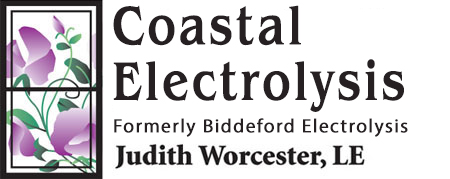|
Why do I have coarse "male" hair on my face? Hair is regulated by
genetics and circulating hormones in the blood stream. First of all,
every woman is covered with hair. Our ideal is to have body hair that is
fine and colorless - this is called vellus hair. Unfortunately, most of
us at some time in our lives, experience a change in the balance of
female / male hormones that turn vellus hair into terminal hair -
coarse, darker, longer hair that looks and feels "male". It has to go!
Females in certain ethnic groups tend to have long, dark hair everywhere
on their body. Puberty, pregnancy, and menopause are the major events
that cause hormone fluctuations that result in terminal hair. Other
factors that affect hormones associated with hair growth are disorders
of the endocrine system (polycystic ovary syndrome, for example),
medication side effects, and stress.
Does electrolysis hurt? With state-of-the-art equipment,
electrolysis treatments are considered to be well-tolerated. The current
that is applied to the hair follicle is quite small and produces a
feeling of heat. Certain body parts have more sensory nerves than
others. A well-trained Electrologist will know how to minimize
discomfort. Many clients say that their electrolysis is relaxing and
that they practically fall asleep! If you can stand tweezing, you can
certainly stand electrolysis.
Is electrolysis really permanent? Yes. When the stem cells in the
hair follicle are destroyed, that follicle will never be able to produce
another hair.
How long does it take? It is very important to know the life
cycle of hair on the human body. Believe it or not, humans have more
hair follicles than many other mammals. Hair is a very important part of
our body's defense system. Our skin has thousands and thousands of hair
follicles and they do not produce hair simultaneously. Hair follicles
cycle through three different stages: the active stage, the
start-to-shed stage and the has-shed stage. Electrolysis destroys the
most stem cells when treated in the active stage. So we must simply
treat hairs as they emerge and while they're in the active stage. This
is a process dictated solely by the physiology of hair growth.
How much does it cost? Treatments are scheduled in increments of
15 minutes. The time for each treatment depends on the amount of
unwanted hair present. Factors such as hair growth cycles, the quantity
and structure of the hair, previous use of temporary hair removal
methods, heredity, hormone dysfunction, certain medications, and stress,
influence the treatment program for each individual. It is important to
follow the recommended treatment plan to achieve optimum results.
Additional questions can be addressed at your FREE CONSULTATION where
Judy can analyze your situation.
|
